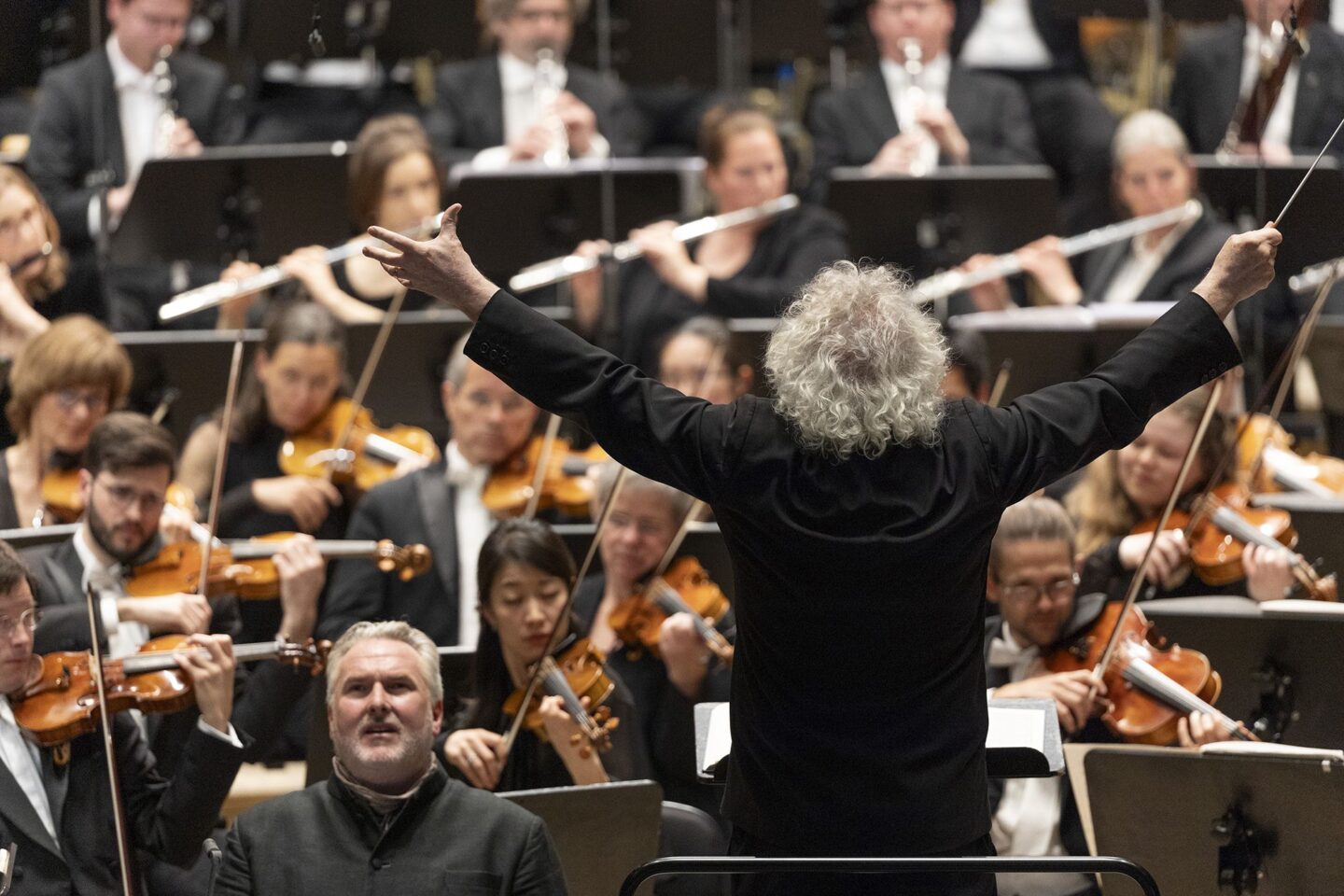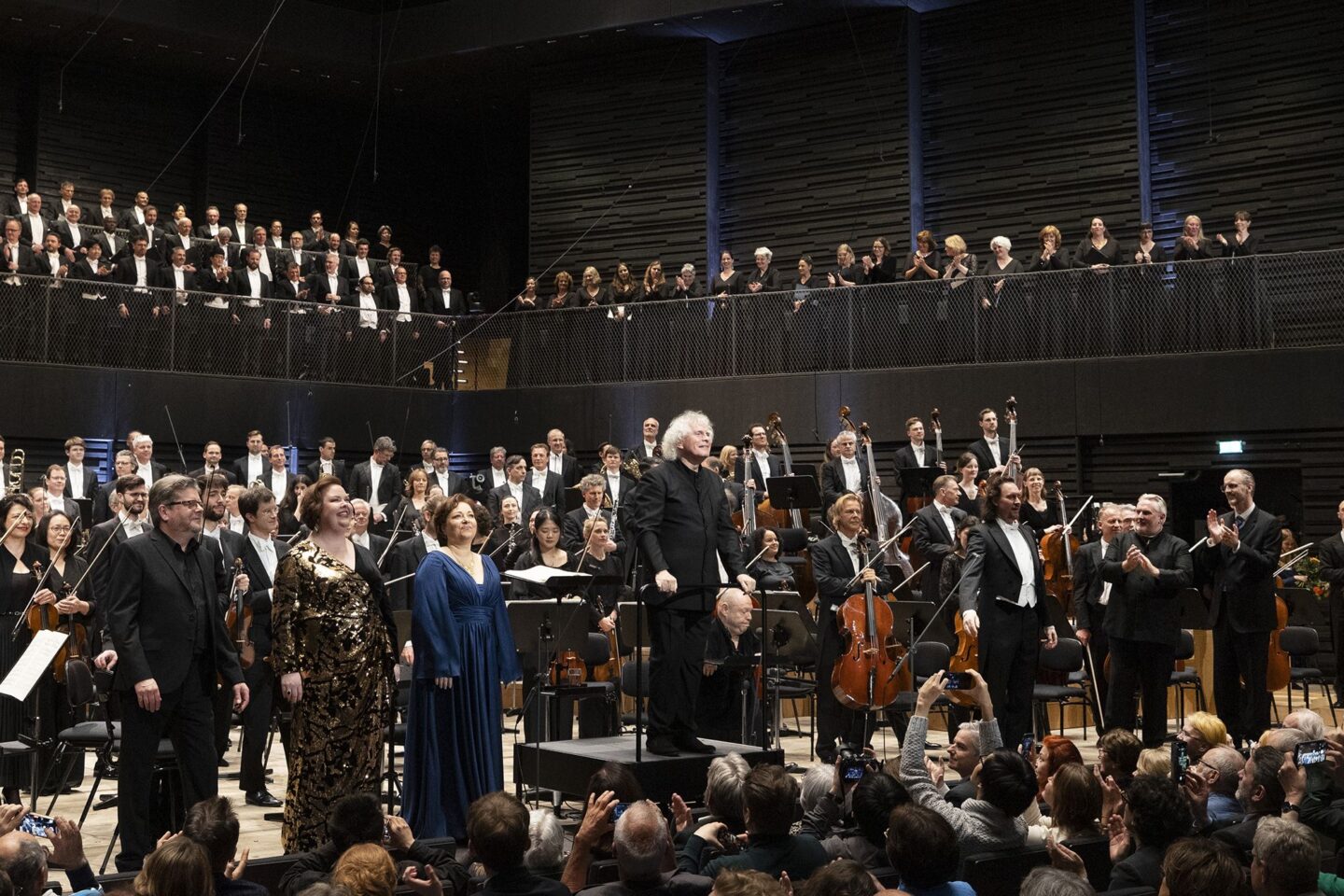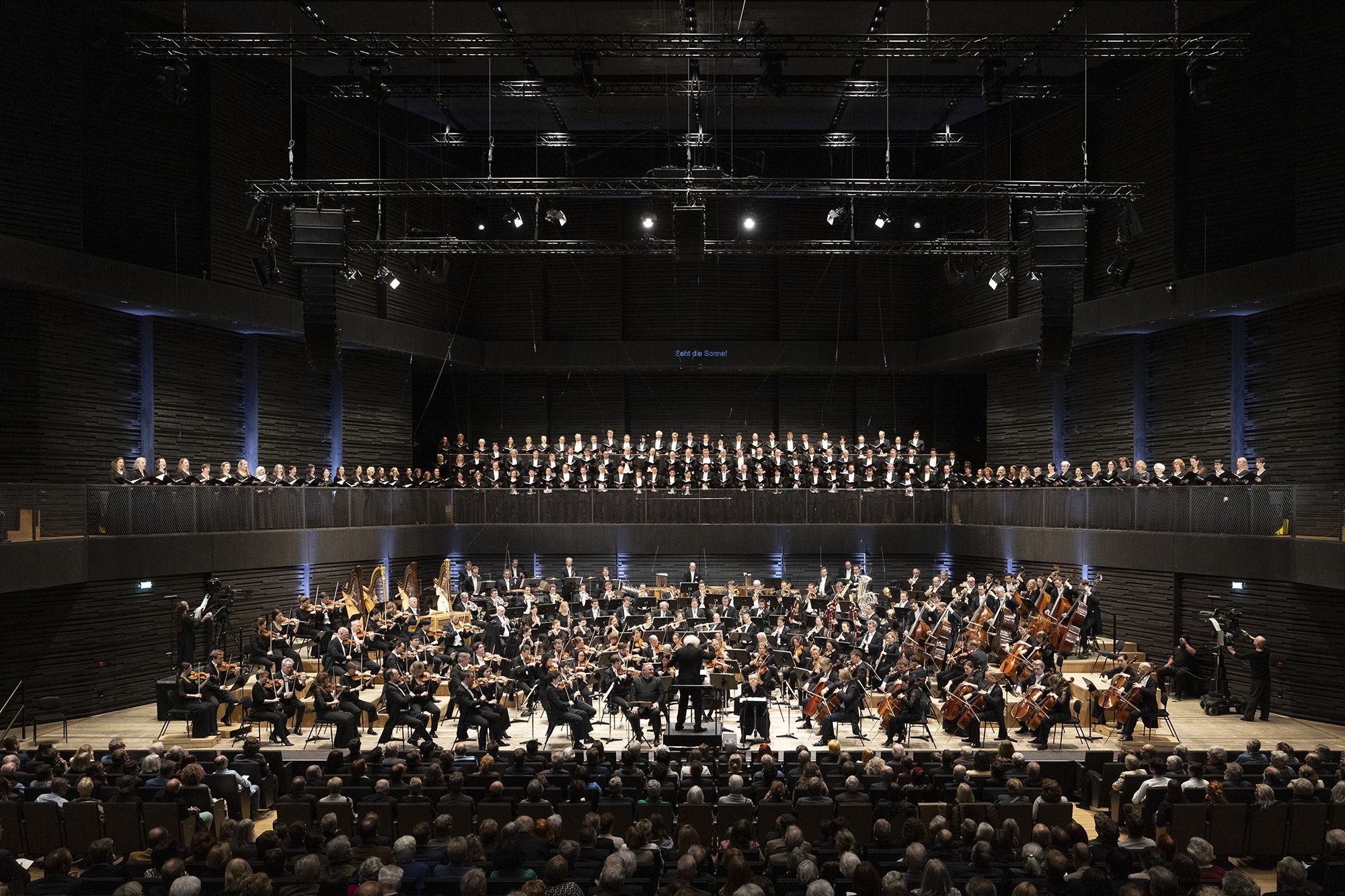For this special evening, marking the 75th anniversary of the Bavarian Radio Symphony Orchestra, the new principal conductor since 2023, Sir Simon Rattle, has chosen a rare piece requiring a remarkably large orchestral and vocal ensemble: Schönberg’s Gurrelieder. This choice is particularly significant as this monumental work has only been performed three times in the history of the Bavarian Radio Symphony Orchestra (BRSO): in 1965 under Rafael Kubelík, in 1988 with Zubin Mehta, and in 2009 with Mariss Jansons (which coincidentally was the BRSO’s 60th anniversary). The BRSO is celebrating its 75th anniversary, and Schönberg 150 years: a grand anniversary indeed!
Sir Simon Rattle is very familiar with Gurrelieder, a score that has fascinated him from a young age, and which he has notably recorded with the Berlin Philharmonic. He describes the piece as “sexy, elegant, and sensual.” This is precisely the highlight of the evening: captivating, intelligent, and inspired conducting. Unlike the enchanting direction of Chailly last February, which flattered a richly charming Royal Concertgebouw Orchestra during the 100th anniversary of Schönberg’s death, Rattle presents a charcoal sketch in the form of a tragic tale. Whether it’s the dark Pierre Soulages of the Isarphilharmonie and Rattle’s suit or a more objective perception, the end of the first part, devastating and tragic, with its funeral march, appears as the counterpart to Mahler’s 6th: black is black… Sharp and dynamic, always coherent and controlled, his vision, fascinating from start to finish, is decisively modern, reflecting the atonal modernity of the Vienna School. More than once, one can hear echoes of Schönberg’s Chamber Symphony or Webern’s Six Pieces for Orchestra, in their complex writing and density.

But Rattle also conducts what could be considered a mini opera, where literal borrowings from Wagner (the Ride of the Valkyries during the second part), echoes of Tannhäuser, and even more unexpectedly and strikingly, Puccinian affinities (Tosca!) are heard, particularly when the ghostly choir interacts with a similarly spectral, disassembled orchestra: Rattle knows his repertoire well and understands how Puccini’s compositional complexity owes much to Schönberg’s harmonic adventures and boldness. Here, one feels the opera conductor at work. Rattle is quite reserved and surprisingly understated in the most “Wagnerian” part of the Gurrelieder. The most accomplished passages from this perspective come after the second part, which is jubilant, almost experimental, with a true talent for highlighting harmonic boldness. The choirs are impressive, both in diction and nuance, and Rattle once again excels in his ability to lighten textures without ever falling into the trap of relying solely on the grand spectacle of the work.

Regrettably, the vocal cast is quite uneven. Dorothea Röschmann has a warm voice but perhaps too subdued for the role of Tove, which demands a lyric soprano with brilliant clarity and the ability to sustain long melodic lines while depicting the intensity of romantic love. We were somewhat distant from this, in a detached approach where one might expect the vocal temperament of an Isolde. Jamie Barton, whose intensity would better suit Verdi than Schönberg, managed to stand out as Waldtaube with a deep and rich voice. However, perhaps the embodiment and cruelty were lacking. Simon O’Neill, with his distinctive tenor timbre, was unable to convey the full emotional range required for the role of Waldemar, but, in mitigating circumstances, he was replacing Stuart Skelton at short notice. His voice was often drowned out by the orchestral tumult, further reverberated by the overly dry acoustics of the Isarphilharmonie. What is needed is a heroic tenor (“Heldentenor”) with great power and a rich timbre, capable of projecting over a large orchestra without losing expressive nuance. One could only dream of hearing Jonas Kaufman in this role. Josef Wagner as the « Bauer » seems somewhat misplaced in this work and in this role, but fortunately, the role is not crucial. The two major stars of the evening, undoubtedly, were Peter Hoare as « Klaus-Narr », charismatic in diction, textual interpretation, and embodiment, leaving us completely satisfied, and Thomas Quasthoff as the narrator, who distinguished himself through both intellectual depth and emotional presence. A diction filled with life, an understanding of the stakes, a true presence. We have one of the best narrators here!
Ultimately, we celebrate a dream orchestra, which I am ready to consider as one of the finest in the world, precise, sharp, and intelligent direction, a stunning choir, and spectacular but uneven solo voices, sometimes overshadowed or unsuitable, too overwhelmed by a first-class, gleaming orchestra. Nonetheless, the evening will leave a lasting memory: a beautiful sonic mastery and a lesson in conducting for this difficult-to-cast work. The triumph in the hall splendidly celebrates this anniversary. Sir Simon Rattle’s tenure is off to the best start. Happy anniversary to the Bavarian Radio Symphony Orchestra!
Philippe Rosset,
April 20, 2024
Sir Simon Rattle Conductor
Simon O’Neill Tenor (Waldemar)
Dorothea Röschmann Soprano (Tove)
Jamie Barton Mezzosoprano (Waldtaube)
Josef Wagner Baryton-basse (Bauer)
Peter Hoare Tenor (Klaus-Narr)
Thomas Quasthoff (Narrator)
Chor des Bayerischen Rundfunks
MDR-Rundfunkchor Chor
Symphonieorchester des Bayerischen Rundfunks


